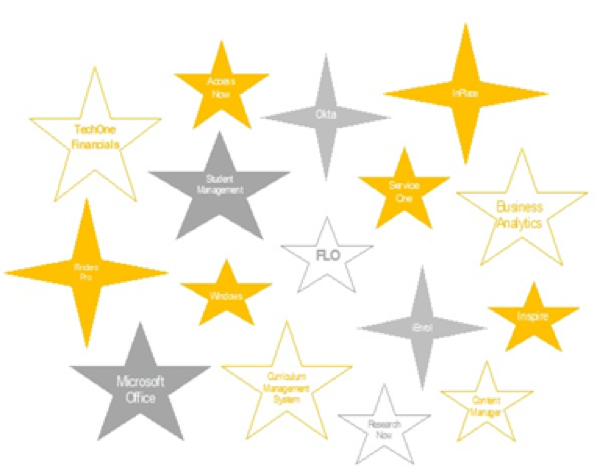Work has begun on a new curriculum management system that will herald for the first time accurate and consistent upkeep of thousands of pieces of curriculum data. What do curriculum management systems actually do and more importantly, how will having one help with quality management at Flinders?

The galaxy of digital systems in an institution such as Flinders can be quite staggering. Even to a layperson not well versed in the wonders of IT, the complexity of the digital architecture is apparent. While each system has a unique function, together they contribute to the effective operation of the whole organisation. Sometimes systems speak to each other. Often they don’t. It is clear that in an era of digital transformation, cohesion and efficiency between systems is becoming increasingly important.
In this timely and interesting Educause article on the top 10 IT issues of 2020, ‘digital integrations’ comes in at number 4 and ‘administrative simplification’ at number 9. What does this mean at Flinders? In terms of curriculum management, a lack of system integration has enabled an era of idiosyncrasy and incongruity to flourish. Pockets of inconsistency in terminology, course design and curriculum architecture, buoyed by historically siloed input and oversight, have been allowed to fester unattended – one person’s major became another person’s stream. As a result, administrative complexity and conflicting interpretations of policy cloud effective and transparent quality management – a situation that exposes potential risk of non-compliance and clearly needs to change:
Today’s administrative services and applications have all the elegance of a Rube Goldberg machine. They were generally designed to conform to the convenience and habits of back-office staff, and as new systems, functions, and requirements were integrated, the user experience receded further and further into the background. Those days are gone, but the systems and services live on.[1]
Disciplinary characteristics and nuance should of course be preserved, but this does not have to be at the expense of consistency and compliance. A curriculum management system will help to overcome the disparities by providing a single source of truth. It will support the Award Courses Policy and Procedures and help to systemically underpin the intentions of the Educational Quality Framework. While it may not have all the answers to the issues circulating the sector (sadly it will not produce a cure for the novel coronavirus or increase federal funding), for Flinders the introduction of a curriculum management system will herald effective, accurate, consistent and compliant data management of the thousands of pieces of curriculum information that make up the educational bedrock of this institution.
[1] EDUCAUSE Review Special Report (2020). Retrieved from https://er.educause.edu/articles/2020/1/top-10-it-issues-2020-the-drive-to-digital-transformation-begins

